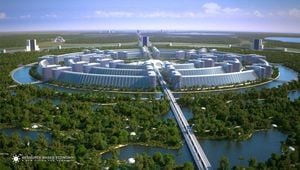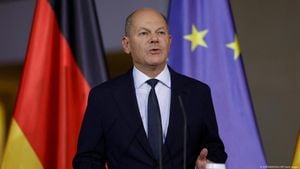Saudi Arabia is gearing up for its 2024 budget, with significant expectations surrounding fiscal policy and economic growth. The government aims to balance economic diversification and sustainability as it shifts reliance away from oil revenues. Finance Minister Mohammed al-Jadaan unveiled components of the upcoming budget, which is expected to exceed $300 billion, reflecting optimism about bolstering various sectors of the economy.
From energy and infrastructure to tourism and culture, the focus is clear: promote sustainable development and reduce dependence on oil income, which has historically dominated fiscal revenues. This pivot is part of the larger Vision 2030 plan initiated by Crown Prince Mohammed bin Salman, which aims at transforming the Kingdom’s economy.
Of note, the last year’s strategies showcased Saudi Arabia’s resilience, with the economy bouncing back after the pandemic setbacks. The International Monetary Fund (IMF) lauded the Kingdom's efforts, predicting real GDP growth of 3.6% for 2024. This positive outlook is underpinned by initiatives to increase foreign investment and support local industries.
Further, various sectors are set to receive increased funding. The budget emphasizes investments targeting education, healthcare, and technological innovation, which are deemed foundational for meeting the future needs of the workforce. The aim here is to create high-quality jobs for Saudi nationals and to ease the unemployment rate among youth.
Research and development will also play pivotal roles; the government is emphasizing partnerships with private tech firms to cultivate innovation across the Kingdom. This strategic move not only aligns with the global shift toward digital economies but also encourages youth engagement within the tech industry.
The focus on tourism is equally noteworthy. With mega-projects like NEOM — set to be a futuristic city powered by renewable energy — gaining traction, the government is betting on tourism as another major revenue stream. The anticipated direct investment of approximately $500 billion reflects confidence in making the Kingdom a leading global tourism destination.
The social welfare aspect of the budget cannot be overlooked. Allocations for programs aimed at enhancing the living standards of citizens, such as housing, health, and community services, are central to the government’s agenda. This sentiment resonates strongly as it addresses the immediate needs of the populace.
The budget also prioritizes environmental sustainability, aligning with global efforts to tackle climate change. Saudi Arabia has announced commitments to generate half of its power from renewables by 2030, and this progressive stance is expected to attract significant international investment.
Critics, nonetheless, remain vocal about the pace of transformation. They argue the need for transparency and effective implementation of initiatives. Addressing these concerns, government officials have reiterated their commitment to accountability and stakeholder engagement.
With the 2024 budget approaching, policy analysts and economists are closely monitoring the Kingdom's moves. They anticipate debates surrounding the allocation of funds, especially concerning social programs, infrastructure projects, and national defense. The overarching theme remains visible: to cultivate lasting economic health grounded on diverse revenue sources.
Beyond sheer numbers, the success of Saudi Arabia's budget rests on the ability to enact change swiftly and effectively. The citizens' eagerness for visible impacts will shape how the government can maintain social cohesion and popular support.
Saudi Arabia's 2024 budget serves as more than just numbers on paper; it holds the promise of transformative change. For many, it reflects hope and opportunity, paving the way for innovation, job creation, and infrastructure enhancements, driving the country toward its Vision 2030 goals.



